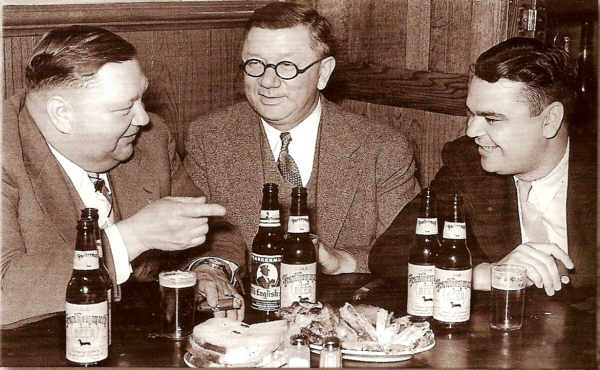 William Zehnder Sr., center, drinking beer with pals, traded his farm, borrowed $4,000 and purchased the abandoned Exchange Hotel to begin his restaurant in Frankenmuth in 1928.
William Zehnder Sr., center, drinking beer with pals, traded his farm, borrowed $4,000 and purchased the abandoned Exchange Hotel to begin his restaurant in Frankenmuth in 1928.
German Work Ethic Key to Frankenmuth:
Pictorial History by Jeremy Kilar
Photographic Album of Pre-Bavarianization Period Gives Interesting Insights
December 23, 2007
By: Dave Rogers
The book cover is a 1935 street view of the town painted by local artist Harold Eckert.
The German work ethic is the particular focus of author and Delta College history professor Jeremy W. Kilar. (Pictured at Right)
Dr. Kilar's "A Valuable Work Ethic: A Pictorial History of Frankenmuth Business," published in cooperation with the Frankenmuth Historical Association, is a fascinating look into the world of work and entrepreneurship of the early Saginaw County pioneers.

Also author of "Germans in Michigan," Dr. Kilar states his thesis: "The casual, yet perceptive, visitor to Frankenmuth will notice something that is clearly evident to every permanent resident: It seems that everyone is busy."
"Indeed the city appears to epitomize the value of the work ethic," he observes, adding: "The pioneer Bavarian farmers were more concerned with continuity and tradition and less concerned with economic success."
The 80-page publication contains more than 140 photos-many of which have never been published before, Kilar noted.
The author chronicles how the pioneer Bavarian farmers who originally settled Frankenmuth instilled a sense of cultural tradition and an unwavering work ethic--characteristics that remain hallmarks of the prosperous southern Saginaw County community.
The book examines the contributions farming, lumbering, transportation and beer manufacturing had on the development of Frankenmuth's business community. It looks at a time period prior to 1960 (Kilar calls it "pre-Bavarianization") when the Bavarian theme began to associate the town with the tourist business.
"Few communities as small as Frankenmuth have come to enjoy a nationwide reputation for hospitality, good food and old-world tradition," Kilar, professor of history at Delta College, says. "While business may be all about making money, there remains in Frankenmuth a deeper sense of commitment-a sense of hometown spirit."
--- Advertisements ---


A zeal for hard work helped early entrepreneurs overcome a less than favorable business climate to successfully launch breweries, restaurants, hotels and seasonal gift shops.
"Like so many successful businessmen-pioneers, Frankenmuth is the result of the efforts of hard-working, everyday folk," Kilar says. "The work ethic has permitted a settlement that essentially had very little in the way of resources, physical attractions, or location to become a leading tourist destination in the state. This work ethic not only marks the town but the entire countryside around Frankenmuth."
The Frankenmuth Historical Association and Museum sponsored the book along with a grant from the Fred G. and Leona M. Geyer Endowment Fund. Kilar says local residents contributed many of the historic photos used in the pictorial, and the Historical Association's photo archives were another source. In addition to the photographs there is a historic map in the frontal end sheet of the book that places old businesses along Frankenmuth's Main Street.
Some of Dr. Kilar's insights are worth sharing, and pondering:
The first homes were log structures until the Frankenmuth sawmill began cutting board when the farmers began to build frame homes;
Human power was used to pull cultivators in the early days;
Wheat, oats, corn and apples were among the first cash crops; milk, cheese and sausage came later;
The old Star of the West mill kept minutes of partnership meetings in German until a corporation was formed in 1929;
The company name was taken from that of a side wheel merchant steamer named Star of the West that was fired on by Southerners in Charleston harbor several months prior to the start of the Civil War;
A woolen mill, cider and jelly works, sawmill, planing works, blacksmith shop, stone works, cheese manufacturing, the Frankenmuth Brewery, the Cass River Brewery, a mutual insurance company, farm equipment works and other industries came early to Frankenmuth;
As early as 1907 an electric-powered interurban line linked Frankenmuth with Bay City, Saginaw, Flint and Detroit for passengers and also hauled coal, sugar beets, empty beer bottles and lumber;
The interurban station doubled as an ice cream parlor; cars came every hour and it cost 10 cents a mile or 25 cents to go to Saginaw; the line ran until 1929 when automobiles and improved roads put it out of business;
--- Advertisements ---


Frankenmuth had no railroad connection until 1907 because city fathers feared the trains might bring "riff raff and undesirable characters;"
The Rummel-Schaefer blacksmith shop became the first car dealership and garage in 1914;
The first school bus in the county, a Model A Ford truck with wooden body, transported children to the new St. Lorenz School on Main Street;
Early doctors in Frankenmuth like Dr. E.A. Pillsbury all ran pharmacies as part of their practices;
The chicken dinner era in Frankenmuth began in the 1850s when early hotels became popular stopping spots for travelers from Bay City and Saginaw to Flint;
William Zehnder purchased the Exchange Hotel that was remodeled to resemble George Washington's home at Mt. Vernon, Virginia, and opened on Mother's Day 1928, serving 60 people at a time;
The Union House Hotel, built in 1888 by Theodore Fischer, offered a room, breakfast and shelter and feed for horses for 75 cents; this hotel became the Bavarian Inn in 1958; and
The grand reopening of the Bavarian Inn coincided with the first Bavarian Festival in 1959.###